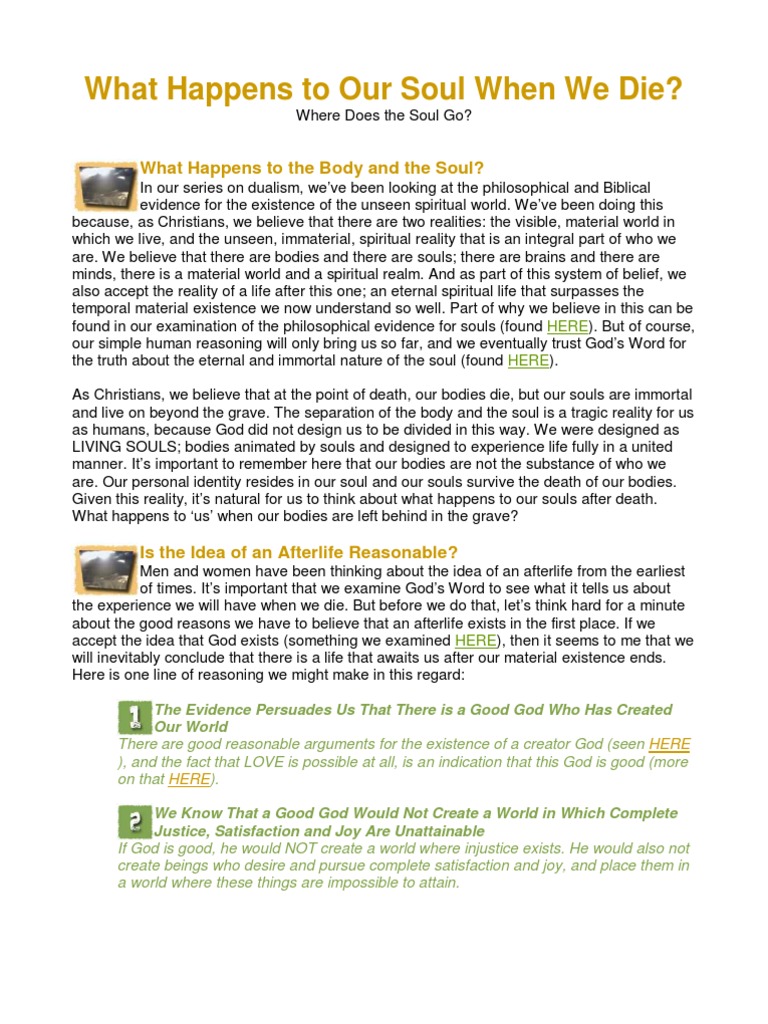The Bahá’í Faith offers profound insights into the nature of the soul and its journey after death. It posits a unique perspective on life, existence, and what transpires when the mortal coil is shed. To explore this topic, one must first ponder a deceptively simple question: What truly happens to our souls when we die? The implications of this inquiry are vast and might even pose a challenge to conventional understandings of life after death.
In Bahá’í theology, the soul is viewed as an immortal essence, distinct from the physical body. It is often described as a mirror reflecting the attributes of God. The teachings assert that the soul is eternal, existing before birth and continuing its journey after the death of the physical form. This concept is both reassuring and liberating, challenging the materialistic worldview that reduces existence to mere biological processes. Through this lens, death is not an end but a transformative transition—similar to a caterpillar’s metamorphosis into a butterfly.
The Bahá’í writings emphasize that, upon death, the soul departs from the physical realm and enters a new phase of existence in the spiritual world. This transition is characterized by the detachment of the soul from its earthly associations and experiences. The process is often likened to waking from a dream—a dream that, while vibrant and significant, is ultimately ephemeral. In this new spiritual reality, the soul begins a journey of discovery, moving into realms of existence that reflect its spiritual development and moral choices made during its earthly life.
One must then consider the nature of this spiritual journey. According to Bahá’í teachings, the soul progresses through various stages after death, each contingent upon the actions, intentions, and character of the individual during their lifetime. This progression is akin to an ascending ladder, with each rung corresponding to higher degrees of spiritual enlightenment and development. The deeds performed in life play a crucial role in determining the soul’s station in the afterlife. This stipulation challenges the oft-held belief that one’s earthly status or material accomplishments dictate their place in the hereafter.
Moreover, the teachings elucidate several key stages that the soul may encounter post-mortem. Upon leaving the physical body, the soul faces an immediate judgment based on its earthly life. This judgment, however, is not punitive in nature. Rather, it serves as a reflective process where the soul perceives its own actions and their repercussions. This introspective context prompts the soul to confront both its virtues and shortcomings. The initial experience of the soul is characterized by a sense of clarity—its true essence becomes apparent as it sheds the illusions of earthly life.
Throughout this journey, the spiritual realms are filled with increasing levels of understanding and enlightenment. Many Bahá’ís believe that souls can interact as they navigate these realms, fostering relationships and connections formed during their earthly existence. The potential for growth remains limitless. It is in these spiritual environments that souls continue their quest for knowledge, wisdom, and an even deeper understanding of the Divine.
Yet, what about those whose actions in life may not reflect a strong moral compass? Bahá’í theology does not advocate for damnation; instead, it emphasizes the opportunity for redemption and growth. The teachings suggest that even those who have strayed in life can reform and ascend spiritually in the afterlife. Every soul is given the opportunity to embrace the realities of its existence and to strive towards higher ideals. This principle underscores the overarching message of compassion and the boundless nature of God’s mercy.
Intriguingly, the concept of reincarnation, commonly found in other religious traditions, is not applicable within Bahá’í belief. Instead, adherents view the soul’s journey as a one-time progression through various spiritual stages. The idea is to focus on the earthly life as a unique opportunity for spiritual growth that will shape the future experiences of the soul in the spiritual realms.
Furthermore, the Bahá’í viewpoint resonates with the concept of interconnectedness among humanity. The soul’s development is influenced by collective human experiences, reflecting the importance of unity in this journey. The actions of individuals can impact not only their destinies but also the progress of their community and society at large. This interconnectedness can be both a challenge and an opportunity: it emphasizes personal responsibility while simultaneously inspiring a sense of belonging and participation in the larger tapestry of existence.
In conclusion, the Bahá’í teachings on the afterlife invite us to reconsider our perceptions of mortality and the soul’s elusive nature. The narrative of the soul’s journey after death transcends a simplistic binary of good and evil, emphasizing instead a holistic development rooted in love, connection, and moral integrity. As one reflects upon what unfolds after the cessation of earthly life, it becomes clear that the Bahá’í perspective not only provides answers but also challenges individuals to elevate their spiritual journey while alive, ensuring that the soul’s eventual transition is one of profound growth and enlightenment. Death, in this light, is not an end but a vital threshold—a passage towards eternal potential and understanding.
